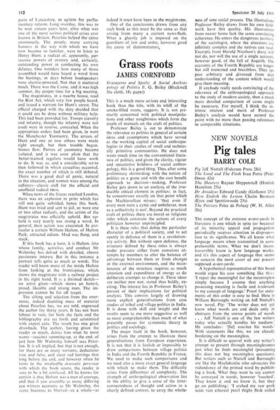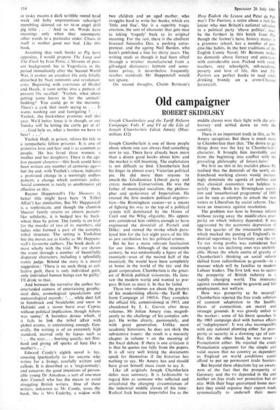NEW NOVELS
Pig tales
BARRY COLE
Pig Jeff Nuttall (Fulcrum Press 28s) The Land and The Flesh Ivan Potrc (Peter Owen 42s) The Shearers Rayner Heppenstall (Hamish Hamilton 25s) Dr Amadetts Edward Candy (Gollancz 25s) Here Endeth the Lesson Chaim Bermant (Eyre and Spottiswoode 25s) The Patriots Peter de Polnay (W. H, Allen 30s) The concept of the extreme avant-garde in literature is one which in spite (or because) of its minority appeal and propagation periodically receives attention in dispropor- tion to its significance. We all know what language means when transmitted in com- prehensible terms. What we don't incon- trovertibly know is how language works; and it's this aspect of language that seems to concern the most avant of our present supposed avant-garde.
A hypothetical representative of this breed would argue his case something like this: `I reject the meaningful for the meaningless simply because I assume that anything possessing meaning is facile and irrelevant to my concept of language.' Proof for state- ments of this order is easy to find. Here is William Burroughs writing on Jeff Nuttall's new novel, Pig: 'The writer does not yet know what words are and deals only in abstracts from the source points of words . . . Jeff Nuttall is one of the few writers today who actually handles his medium.' He concludes: '[he] touches his words.' With statements like this, we are already bordering on the meaningless.
It is difficult to quarrel with any writer's attempt to present through meaninglessness just what he finds meaningful (presuming this does not beg meaningless questions). But writers such as Nuttall and Burroughs are like the Macluhanite who advocates the redundancy of the printed word by publish- ing a book. What they want to say cannot be conveyed in words, however 'touched'. They know it and we know it, but they go on publishing: 'I arched my raw pork satin vast ethereal pearl thighs flesh rolled
in tusky moons a dark scribble round head week old baby unpretentious schoolgirl mumbling skinned rat SO NEAR angel drill pig little . . .' And so on. Words have meanings only when they accompany other words in a particular order. Chaos in itself is neither good nor bad. Like this book.
Assuming that such books as Pig have opposites, I would propose The Land and The Flesh by Ivan Potrc, a Slovene of peas- ant background. Set in Yugoslavia in the period immediately after the Second World War, it evokes an arcadian life only fitfully disturbed by Nazi remnants and revolution- aries. Beginning with overtones of Hrabel and Hasek, it soon settles into a pattern of peasant life recalled: 'Yuzhek, what about getting some leaves in for the animals' bedding? You could go in the morning. There's a cask that needs seeing to . . It wants washing out and fumigating ! . . . Yuzhek, the buckwheat promises well this year. We'd better fence it in though, or our Tunika will be letting the cattle get at it! . .. God help us, what a burden we have to bear! . .
Yuzhek Hedl, in prison, relates his tale to a sympathetic fellow prisoner. It is one of primitive love and fear and is as common as people. He has loved three women, a mother and her daughters. There is the age- less peasant closeness—this book could have been written any number of centuries ago— but the end, with Yuzhek's release, indicates a profound change in a seemingly endless pattern; a change which continues today. Social comment is rarely as unobtrusive yet effective as this.
Rayner Heppenstall's The Shearers (a better title might have been 'A Tribal Affair') has similarities. But Mr Heppenstall is a sophisticate, and though the clannish Shearer family retains an almost peasant- like solidarity, it is hedged less by buck- wheat than by privet. The family is on trial for the murder of two of its members, old ladies who formed a part of the complex tribal structure. The setting is Yorkshire but the mores are as Gallic as Mr Heppens- stall's favourite authors. The book deals al- most wholly with the trial. We are shown the event through a number of beautifully disparate characters, including a splendidly ironic judge. Behind the story is a moral suggestion: 'There is no such thing as col- lective guilt, there is only individual guilt, only individual human beings can be guilty.' Ill drink to that.
And between the narrative the author has interlarded cameos of entertaining geophy- sical data, cosmological speculations and meteorological records: '... while sleet fell in Innsbruck and Stockholm and snow in Helsinki and a storm burst over Cyprus without political implication, though Athens was sunny.' A harmless device which, if it fails to link the tribal affair with global events, is entertaining enough. Gen- erally, the writing is of an extremely high standard, marred only by lapses such as . . the eyes ... burning quietly, not flint- hard and giving off sparks of hate like a mother's ...'
Edward Candy's eighth novel is fey, amusing (particularly so for anyone wisp writes for a living), carefully written and callous. It is described as a `tragi-comedy', and concerns the good intentions of person- able young Dr Amadeus, a sort of one-man Arts Council who has the means to assist struggling British writers. One of these writers, unknown to Mr Candy, saves the book. She is Mrs Enderby, a widow with two children and an aged mother, who struggles hard to write her books, which are `little and fine'. She is a superbly tragic creation, the sort of character that gets near to taking 'tragedy' back to its original meaning. For the rest, there is the ebullient bisexual Sunandra Das, a pushing entre- preneur, and the ageing Neil Burden, who hasn't published a line for thirty years. The writing reads as though it had been sifted through a strainer manufactured from a gilt-edged dictionary; latinate and some- times prissy, it nevertheless frequently reaches standards Mr Heppenstall would not ignore.
On second thoughts, Chaim Bermant's
Here Ended, the Lesson and Peter de Pol- -nay's The Patriots, a satire about a rich fin- ancier who sees Britain's national salvation in a political party 'above politics', must be the furthest in this batch from Pig. though the former's hero, history master in a grammar school, has a number of por- cine-like habits. In the best traditions of the English Comic Novel, Mr Bermant makes no demands above literacy and entertains with considerable ease. Packed with randy - teachers, sexy schoolgirls, sub-academic poverty and love of life, this and The Patriots are perfect books to read while drinking brandy on a cross-Channel hovercraft.



































 Previous page
Previous page